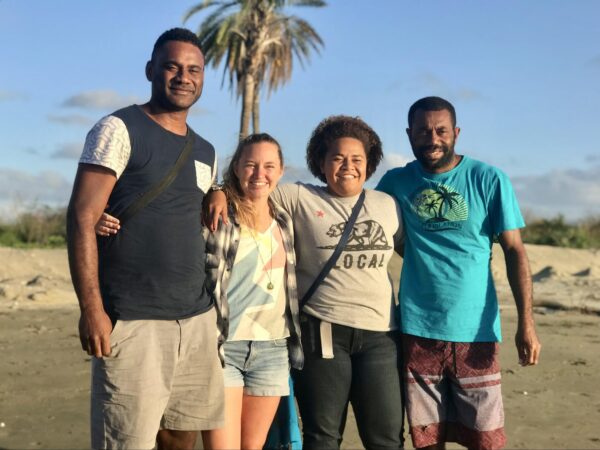
Some of Verto’s South Pacific staff in Fiji. Local Program Leaders, traveling Program Leaders, Academic Success Coordinators, and instructors work together on a student-centered team.
This month, Verto students will embark on an incredible first-year experience where they will explore, create and learn about the world with our amazing Field Instructors, Program Leaders, and Support Staff by their sides.
As the faces of our organization, our dedicated staff are the people who foster student success and make our experiential learning curriculum come to life. Verto hires only the best of the best when it comes to supporting and inspiring our students. So who are these phenomenal mentors and how do they end up working with Verto?
We sat down with Diversity, Equity & Inclusion Lead, Malea Malik, and Hiring Manager, Emily Stickle to learn more about how Verto recruits and hires our exceptional staff. They share about Verto’s intentional recruitment and hiring practices and the organization’s commitment to diversity.
Malea and Emily, thanks for joining to tell us more about Verto’s hiring process.
Emily: There are tons of traits that make for amazing staff, but overall, we look for people who embody our mission: people who have a deep understanding of their subject, are student-centric, and unwaveringly committed to our vision of inclusive, cross-cultural and experiential education. We love to see staff who have worked with audiences and cultures other than their own and who exhibit flexibility, adaptivity and passion.
Malea: A huge part of our mission is accessibility and diversity so we definitely look for staff who reflect and prioritize those values. One of the most important questions on our application is about how the applicant is committed to creating and honoring a diverse work environment. We want to know where staff place the value of diversity because we are on the way to developing a more inclusive culture and we need staff who are equally committed to our vision and goals.
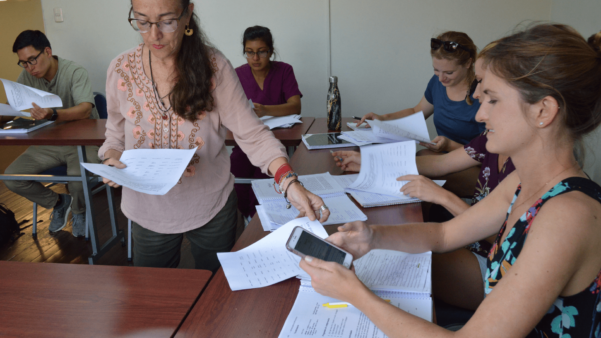
Instructors have the flexibility to optimize learning outcomes in and outside of a traditional classroom environment, and consistently uphold Verto’s commitment to an inclusive community in student groups.
It sounds like seeking out diversity is critical to the hiring process. Why is staff diversity so important to Verto?
Malea: Speaking from my own personal experience, I was one of two people of color in my study abroad program during my senior year. All of the staff on our program was white as well and I didn’t feel like I was getting the support that I needed. It was hard to navigate the shell shock of being abroad and out of my comfort zone without mentors who could relate to my perspective and experiences.
Verto’s first priority is always student safety, wellness and success, and our staff play a critical role in ensuring that. When students are on the ground and they are navigating an experience like being trans in another country, or being a minority in another country, having a program leader who has also been through something like that before is incredibly important and impactful. Representation plays a huge role in student mental health and self-esteem.
Erin: This is true especially on Verto programs where staff spend so much time with students in and out of the classroom. A Verto teacher is not only a student’s instructor; they’re also the person students might have a morning coffee with, or do extracurricular activities with. Our staff is there to support students not only on an academic level, but also in their personal, social and emotional development. That’s why it’s critical to us that our students have staff they can relate to and feel comfortable exploring any topic freely with.
Malea: More broadly speaking, diversity also benefits our ability to teach incredible curriculum and create highly impactful programming. When our staff is more diverse, we open up a whole new arena of fresh and unique ideas that will help us best cater to our students’ needs. If we didn’t seek out diverse perspectives, our organization wouldn’t thrive as much as it possibly could.
At Verto, we also have a fundamental belief in the power of cross-cultural exchange to build compassion and a better world. There are a lot of injustices that would be remedied if people valued diversity of thought and difference of being.

On Verto semesters, students grow as global citizens, learning to ask questions and reflect on other cultures and perspectives, mirroring Verto’s values.
Given all of those benefits, what are Verto’s specific goals when it comes to staff diversity?
Emily: At a minimum, we want to have the ratios of our students reflected in our staff. So if, for example, we were to have 30% students of color, we will prioritize having that same percentage in our staff. That applies to any metric for diversity, whether that’s being part of the LGBTQ+ community, being first-generation American, or gender ratios.
We are actively striving to go far beyond this though. We are aiming for our applicant pool to reflect the ethnic breakdown of the U.S., and then for our organization to reflect that as well. What we have done and achieved so far is just a start and we are working continuously to make all parts of Verto more diverse and inclusive.
How do you intentionally seek out these amazing and diverse staff?
Emily: We are committed to equitable hiring practices and this year especially, Verto invested heavily in recruitment to support that vision. We were very intentional about casting our net outside the scope of our usual circles so that we could see applicants from all walks of life. We researched and placed our ads on tons of diverse career boards, including Diversity Abroad, HBCU, Veteran Affairs, and LGBTQ+ pages.
Malea: We wanted to make sure our application was accessible to groups that are often incredibly qualified but overlooked.
Another key point here is that we make sure to use language in our job descriptions and applications that is inclusive and would not discount any pool of candidates. We invite candidates with varying educational backgrounds and types of experiences to apply.
Emily: Once we have brought in applicants, we are also thorough about gathering and tracking demographic data so that we can clearly evaluate what audiences we have reached and where we have room for growth. For example, this year we noticed that while we were very successful in recruiting applicants who identified as Black, we would like to have reached more individuals who identify as Indigenous American and Asian, and will strive for that in the future.
We encourage applicants to answer the government Equal Employment Opportunity (EEO) questions by including a statement on our application that reaffirms that answers are anonymous and shares our intention of using that data to improve.
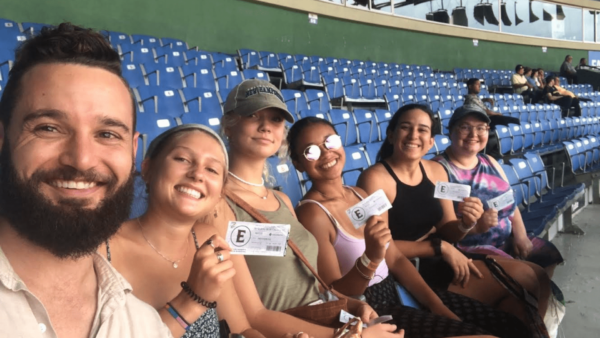
Experiences outside the classroom – like these students with a Program Leader and instructor at a baseball game in the Dominican Republic – are impactful (and fun) ways for students and staff to open dialogue about other cultures and perspectives.
What were the results of those strategies in terms of the applicant pool?
Malea: Our efforts paid off. We attracted amazing and highly qualified candidates. Verto is a fairly new organization so to see so much interest from such accomplished people was a powerful testament to the work we do.
In terms of diversity, we brought in people from all backgrounds including many people of color, different age ranges, and a pretty even balance between female and male applicants.
Emily: We were glad to see that 29% of our applicants identified as people of color which was a significant increase from past years. Given the incredibly strong applicant pool, it was easy for us to reach our diversity goals in hiring as well. We ultimately hired the top 4% of all applicants.
Are these trends different from what you’ve noticed in other experiential and international education spaces?
Malea: I’ve been professionally connected to study abroad and experiential education for years, and I’ve always noticed that these spaces are primarily enjoyed by more affluent, white students and professors.
Emily: Higher education, in general, is a very white, male-dominated space. In a report from the National Center for Education Statistics, I saw that in 2017, 81% of full-time professors at post-secondary institutions were white and 64% were male. This is the audience that our students will be interacting with when they are on campus. We are working very hard to push against this harmful status quo in Verto classrooms and are motivated by the positive results we’ve seen from our efforts thus far.
Malea: Over the last year, Verto has grown so much more inclusive as far as our conversations, collaborations and recruiting and hiring practices. Our team is open to talking about these topics that can sometimes be harder to talk about and we create safe spaces to do so. It’s been great to see leadership be so supportive of and proactive about diversity, equity and inclusion goals and values.
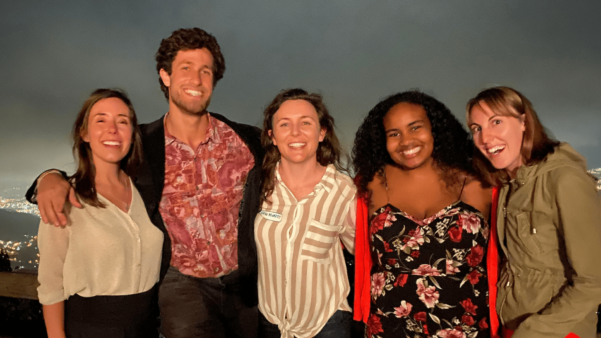
A few of the Verto programming staff during Parents Weekend in Costa Rica.
Once you’ve brought in all these amazing staff, how does Verto work to retain and support them?
Malea: We want all of our staff to feel supported and valued, so we create intentional spaces to cater to that. For example, we have biweekly “Cafe Conversations” where staff meets to talk about a topic that is socially relevant in an open forum. These no-judgment, informal conversations offer opportunities for staff to share their unique perspectives and interact across departments.
I also host open office hours once a week where I create a space to hear any concerns or feedback and can provide any resources or support that staff may be looking for. I’m also always eager to talk to staff about where Verto is in terms of our diversity goals and provide the data for them.
Emily: Additionally, all of our program staff attend an annual training where they learn more about embodying Verto’s mission, get to know one another, and build a meaningful community together. Jackie Broussard, our Equity Consultant, and Trainer, designs and leads sessions dedicated to themes of equity and antiracism, and other topics suggested by staff. Everyone is looking forward to our upcoming training on allyship.
In general, we love to have an ongoing dialogue with staff about our core values and are excited to be starting a semester-long book club on the book We Want to Do More Than Survive: Abolitionist Teaching and the Pursuit of Educational Freedom.
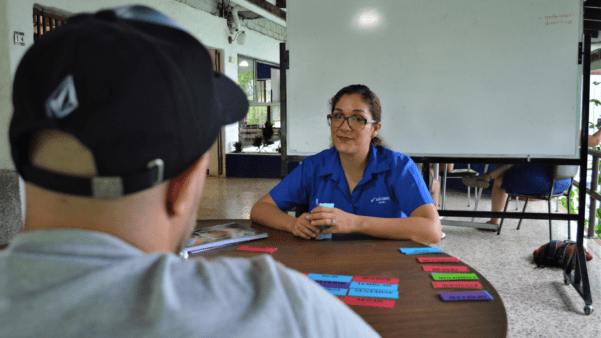
Students have access to academic support and personal support, ensuring that we’re helping both students and staff to form lifelong communities and connections.
It seems like Verto’s efforts are off to a great start! What are Verto’s goals when it comes to staff and diversity for the future?
Malea: For starters, we want to expand on our company-wide training sessions. We had an entire training session dedicated to implicit bias to help ensure that our staff is prepared to build safe, supportive relationships with all students and other team members. We got great feedback from that and we’d love to have more workshops like that in the future.
The team has also mentioned that they’re interested in employee resource groups with different focuses, for example, a “Women at Verto” group, where people can form sub-communities, develop mentorship relationships, and collaborate on resources for Verto staff and student curriculum.
Emily: Overall, while we are proud of what we’ve achieved, we also completely recognize that we aren’t as diverse as we want to be and we are actively working towards becoming more diverse on all fronts and in all departments. We understand that we have a lot of work to do as an organization when it comes to diversity and inclusion and we are ready to do that work.
Malea: That’s why we get up every day and come to work. It’s because we want the organization that we work for, and the people and communities that we work with, to thrive. We are ready to do everything in our power to further that vision.
Thank you Malea and Emily for taking the time to share about Verto’s intentional hiring practices!
At Verto, we are committed to making a meaningful and impactful first-semester accessible to all students. Learn more about Verto’s commitment to diversity, equity and inclusion here.

